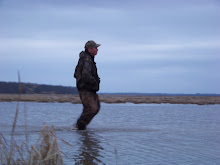"Raising Money"
I began frequenting a handful of such contests five or six years ago. Over that time, I have come to grips with the reason I keep getting invited back: I am a warm body with a shotgun and an entry fee, and nothing more. I am no threat to anyone hoping to take home a trophy.
At first, I took myself and the spectacles quite seriously. I showed up early and warmed up on the practice range. The night before the events, I cleaned my shotgun and stood in my bedroom swinging the barrel from one side to the other, keeping the bead on a plane with the crown molding to practice moving through the target. I researched target loads and tried to match the best ones with the make and model of my shotgun.
Once, I even tried on one of those black mesh Bob Allen trap shooter’s vests and gave serious consideration to buying one, along with some yellow-tinted shooting glasses. I soon came to my senses, however, and realized they wouldn’t improve my shooting any more than a pair of argyle knickers and a St. Andrews golf cap would better my golf swing, and I’d look just as ridiculous. I hung the shooter’s vest back on the rack with “All hat and no cattle” whispering through my head.
That all lasted about two or three years. Finally, after yet another shoot in which I’d struggled to break 50, I determined I was a better philanthropist than a shotgunner when it comes to charity sporting clays tournaments. I altered my outlook on these events, and started to think of them not as semi-serious competition, but more like tee-ball games where every child gets to bat every half-inning. There are no losers here.
That’s good, too, because if it wasn’t for the soothing balm of charity and goodwill, I’d be pretty darned despondent over my inability to hit crossing shots coming from my left, or rabbits with their black undersides facing me. If quail ever evolve to the point that they can roll across the ground with their bellies facing me, randomly bouncing up in the air every so often, I’ll never kill another one for the rest of my life.
The other good thing about shooting for charity is the apparent immunity from ridicule it provides. Normally if I shot 48 around my buddies, I’d catch an unconscionable amount of grief from them (although they should be used to it by now). On the other hand, folks seem to hold their tongues when you’re shooting poorly for a good cause. This subtle benefit does not get the advertising attention in the flyers for these shoots that it deserves; but it should. Lots more folks might attend if they knew going into it that, after shooting a 2, their teammates would quietly collect up their shell bags and scatterguns and walk down to the next stand, as they would after someone breaks all 10.
I figure over the past six years or so since I started getting invited to these charity clays tournaments, I’ve donated 600-something shells and at least twice that in entry fees. Curiously, though, my shooting hasn’t really improved at all.
Still, I’ve met some neat folks and made some good friends at these events. And I’ve helped raise a little money for some really deserving people who’d love nothing more than to be able to miss 61 out of 100 targets like I usually do. So I try to keep my perspective better than I typically keep my eye on my target, and bear in mind that raising money, if not my score, on a clays course is a guaranteed way to spend a great day outdoors.
(c) Roger Guilian 2009

